I am trying to develop my own kernel which I am booting to with GRUB.
In order to display strings with variables, I have started to develop my own printf(char*, ...) function.
Here is the kernel.cpp (thanks to Write Your Own Operating System YouTube tutorial for the main loading part (printf is my code entirely))
#include <stdarg.h>
#define VGA_BLACK 0
#define VGA_BLUE 1
#define VGA_GREEN 2
#define VGA_CYAN 3
#define VGA_RED 4
#define VGA_MAGENTA 5
#define VGA_BROWN 6
#define VGA_GREY 7
#define VGA_BRIGHT 8
#define VGA_DEFAULT_FG VGA_GREEN
#define VGA_DEFAULT_BG VGA_BLACK
volatile char* videoMemory = (volatile char*)0xB8000;
unsigned int color = ((VGA_DEFAULT_BG<<4) | (VGA_DEFAULT_FG & 0x0F));
void putchar(char c){
*videoMemory++ = c;
*videoMemory++ = color;
}
void printInt(int number){
if(number <= 0){
putchar('0');
return;
}
int diget = number/10;
char c = diget + 48;
putchar(c);
int newNum = diget%10;
printInt(newNum);
}
int strlen(char* str){
int len = 0;
for(int i = 0; str[i] != '\0'; i++){
len++;
}
return len;
}
void printf(char* msg, ...){
va_list args;
va_start(args, msg);
for(int i = 0; i < strlen(msg); i++){
if(msg[i] == '%'){
i++;
if(msg[i] == 'd'){
i++;
int res = va_arg(args, int);
printInt(res);
} else if(msg[i] == 's'){
i++;
char* c;
do{
c = va_arg(args, char*);
putchar(*c);
} while(c != '\n');
} else {
putchar('%');
}
} else {
putchar(msg[i]);
}
}
va_end(args);
}
void setColor(char fg, char bg){
color = ((bg<<4) | (fg & 0x0F));
}
typedef void (*constructor)();
extern "C" constructor start_ctors;
extern "C" constructor end_ctors;
extern "C" void callConstructors(){
for(constructor* i = &start_ctors; i != &end_ctors; i++){
(*i)();
}
}
extern "C" void kernelMain(void* multibootStructure, unsigned int magicNumber){
setColor(VGA_GREEN+VGA_BRIGHT, VGA_BLACK);
printf("Booting %s", "Test System");
while(true);
}
As you can see, it displays the first character and 'S'.
If I were to change the message to "My Custom Kernel", this is the result:
As you can see here, it again prints the first letter and then 'S'.
Why is this happening? By my understanding, va_args changes char to int, however this does not explain why it only displays the first letter along with an 'S'.
Why is this happening and how can I fix this?
Edit:
This has also been compiled with the flags: -m32 -fno-use-cxa-atexit -nostdlib -fno-builtin -fno-rtti -fno-exceptions -fno-leading-underscore

